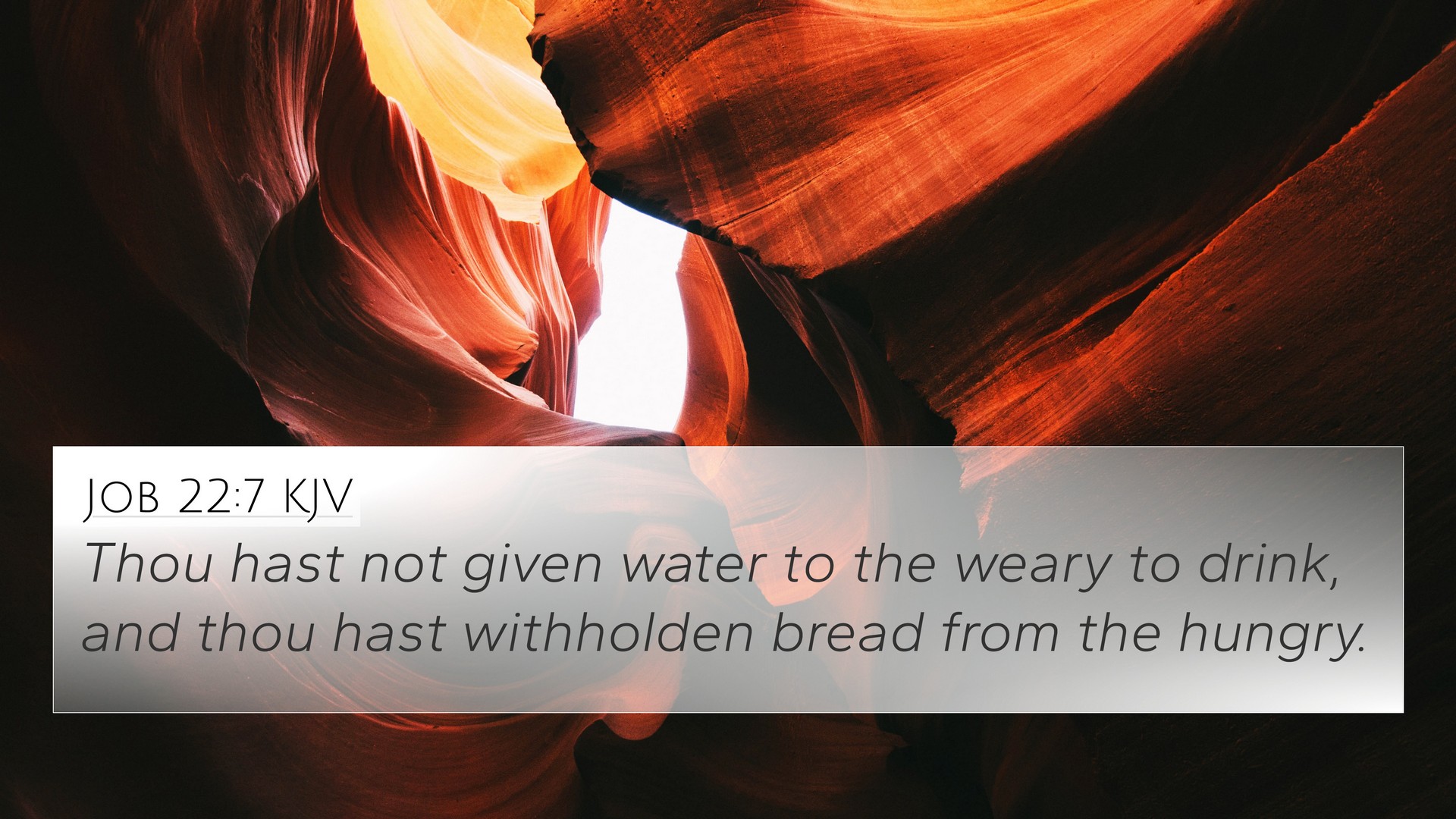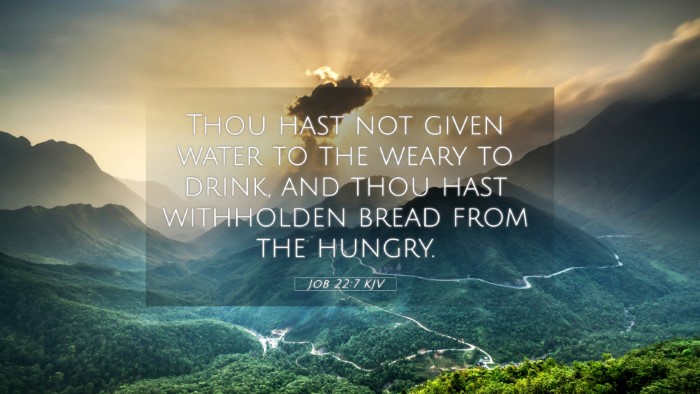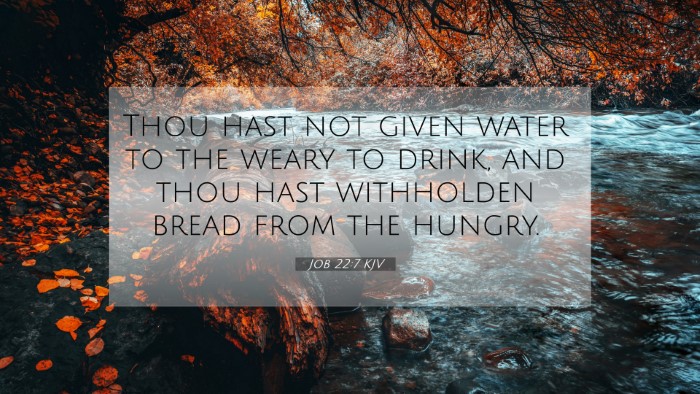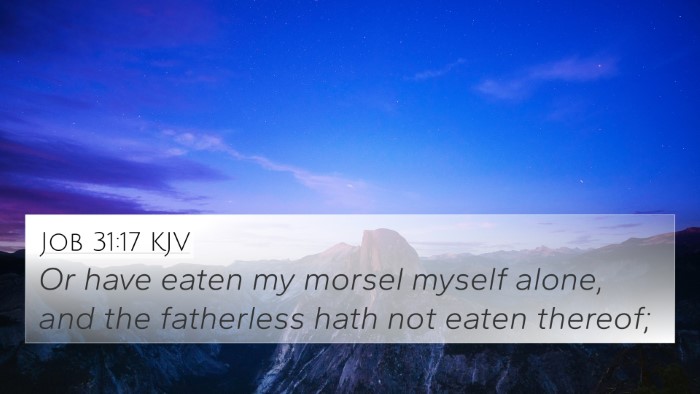Old Testament
Genesis Exodus Leviticus Numbers Deuteronomy Joshua Judges Ruth 1 Samuel 2 Samuel 1 Kings 2 Kings 1 Chronicles 2 Chronicles Ezra Nehemiah Esther Job Psalms Proverbs Ecclesiastes Song of Solomon Isaiah Jeremiah Lamentations Ezekiel Daniel Hosea Joel Amos Obadiah Jonah Micah Nahum Habakkuk Zephaniah Haggai Zechariah MalachiJob 22:7 Similar Verses
Job 22:7 Cross References
Thou hast not given water to the weary to drink, and thou hast withholden bread from the hungry.
Uncover the Rich Themes and Topics of This Bible Verse
Listed below are the Bible themes associated with Job 22:7. We invite you to explore each theme to gain deeper insights into the Scriptures.
Job 22:7 Cross Reference Verses
This section features a detailed cross-reference designed to enrich your understanding of the Scriptures. Below, you will find carefully selected verses that echo the themes and teachings related to Job 22:7 KJV. Click on any image to explore detailed analyses of related Bible verses and uncover deeper theological insights.
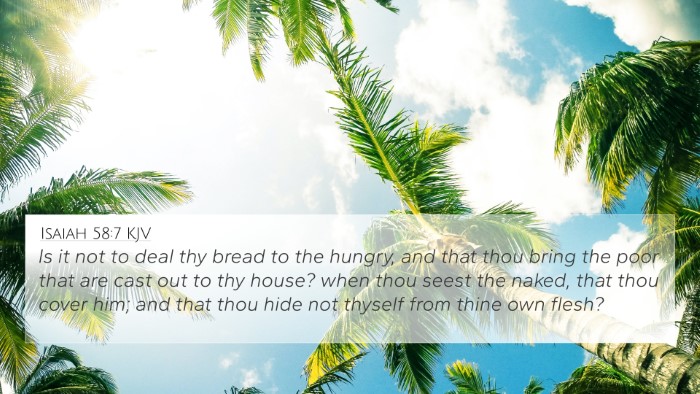
Isaiah 58:7 (KJV) »
Is it not to deal thy bread to the hungry, and that thou bring the poor that are cast out to thy house? when thou seest the naked, that thou cover him; and that thou hide not thyself from thine own flesh?
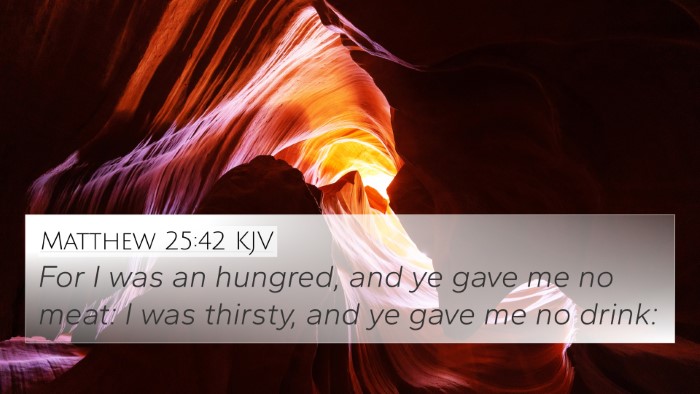
Matthew 25:42 (KJV) »
For I was an hungred, and ye gave me no meat: I was thirsty, and ye gave me no drink:
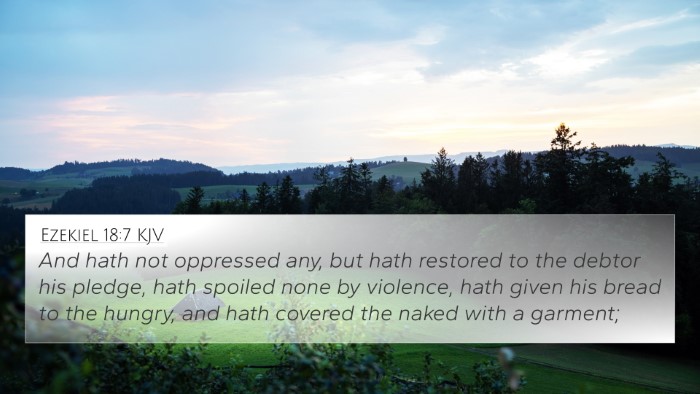
Ezekiel 18:7 (KJV) »
And hath not oppressed any, but hath restored to the debtor his pledge, hath spoiled none by violence, hath given his bread to the hungry, and hath covered the naked with a garment;

Ezekiel 18:16 (KJV) »
Neither hath oppressed any, hath not withholden the pledge, neither hath spoiled by violence, but hath given his bread to the hungry, and hath covered the naked with a garment,
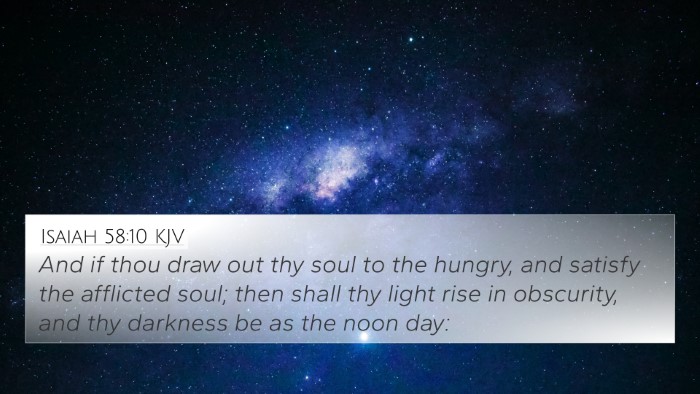
Isaiah 58:10 (KJV) »
And if thou draw out thy soul to the hungry, and satisfy the afflicted soul; then shall thy light rise in obscurity, and thy darkness be as the noon day:
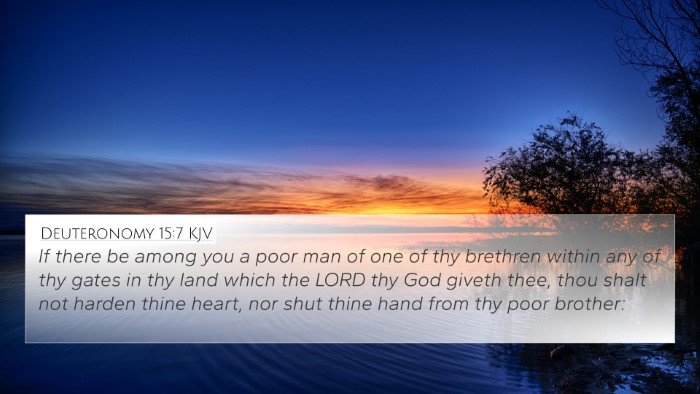
Deuteronomy 15:7 (KJV) »
If there be among you a poor man of one of thy brethren within any of thy gates in thy land which the LORD thy God giveth thee, thou shalt not harden thine heart, nor shut thine hand from thy poor brother:
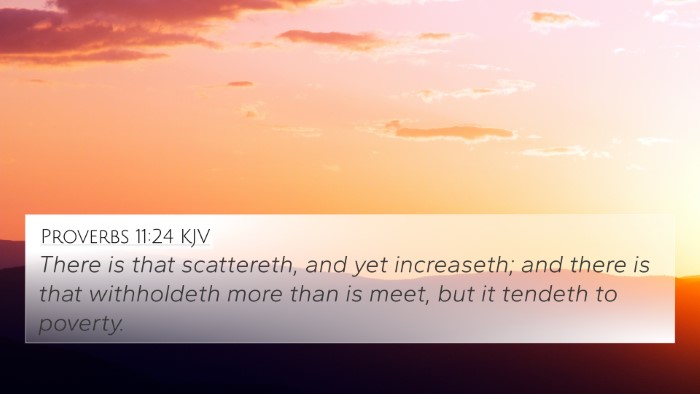
Proverbs 11:24 (KJV) »
There is that scattereth, and yet increaseth; and there is that withholdeth more than is meet, but it tendeth to poverty.
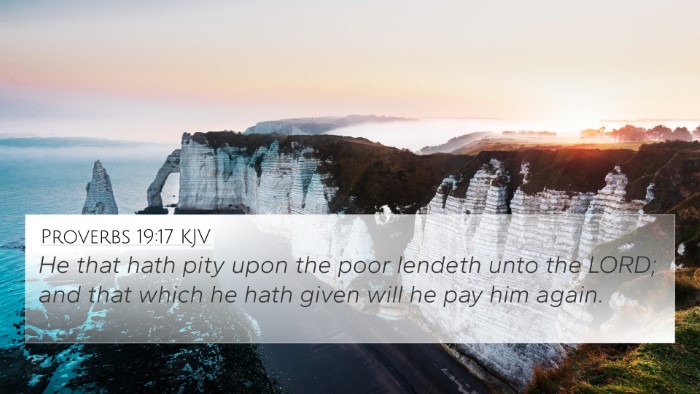
Proverbs 19:17 (KJV) »
He that hath pity upon the poor lendeth unto the LORD; and that which he hath given will he pay him again.
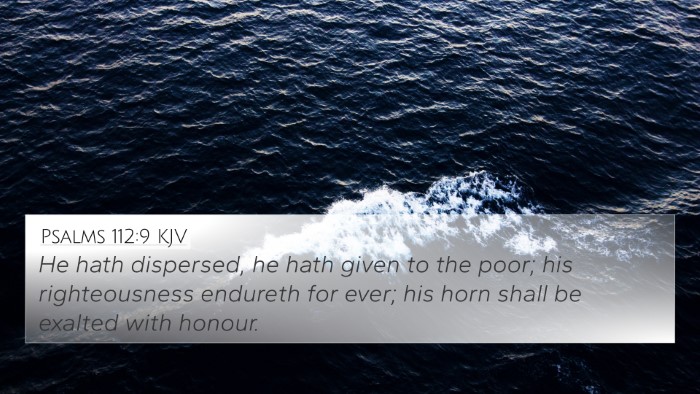
Psalms 112:9 (KJV) »
He hath dispersed, he hath given to the poor; his righteousness endureth for ever; his horn shall be exalted with honour.
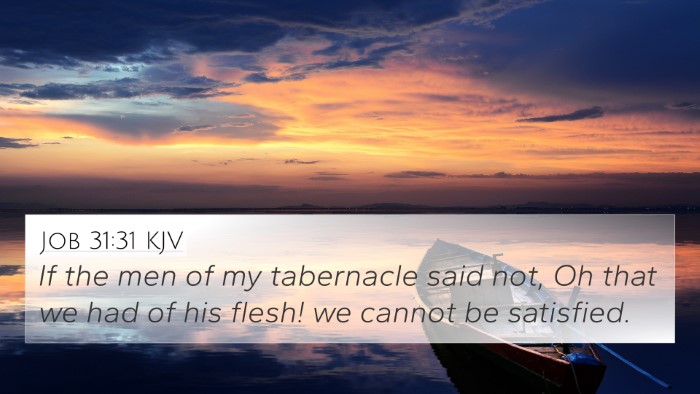
Job 31:31 (KJV) »
If the men of my tabernacle said not, Oh that we had of his flesh! we cannot be satisfied.
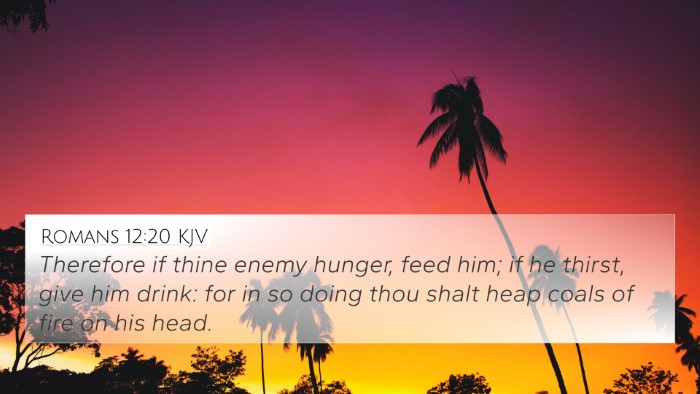
Romans 12:20 (KJV) »
Therefore if thine enemy hunger, feed him; if he thirst, give him drink: for in so doing thou shalt heap coals of fire on his head.
Job 22:7 Verse Analysis and Similar Verses
Understanding Job 22:7
Job 22:7 states: "Thou hast not given water to the weary to drink, and thou hast withheld bread from the hungry." In this verse, Eliphaz the Temanite is admonishing Job, implying that his afflictions are a result of his failure to act justly towards others. This verse opens a significant dialogue on the theme of social justice and the responsibilities that individuals have to care for the needy.
Summary of Insights from Public Domain Commentaries
The interpretations from different biblical scholars provide a multifaceted understanding of this verse. Matthew Henry emphasizes the moral obligation of individuals to support the weary and hungry, suggesting that such neglect can lead to divine judgment. Albert Barnes notes that the accusations made by Eliphaz highlight a self-righteousness that was common in his views, suggesting that Job's suffering was due to failure in his social duties. Adam Clarke elaborates on this, viewing the verse as a denunciation of Job's behavior, illustrating that the accusations extend beyond mere physical sustenance to include emotional and spiritual neglect as well.
Key Themes and Cross-References
This verse is intricately linked with several themes within the Scriptures, ranging from the importance of charity to God's expectations of justice. Below are key Bible verses that relate to Job 22:7:
-
Matthew 25:35-40:
Jesus speaks about the righteous who fed the hungry and provided for the needy, linking their actions to serving Him directly.
-
Proverbs 14:31:
This verse states that he who oppresses the poor insults his Maker, amplifying the notion of accountability for how we treat the needy.
-
Isaiah 58:10:
A call to care for the hungry and satisfy the afflicted, which emphasizes God's desire for His people to be compassionate.
-
James 2:15-17:
James discusses faith without works, illustrating that our faith is shown by how we care for others, echoing Job's neglect.
-
Psalms 41:1:
This verse highlights the blessedness of those who consider the poor, further validating the sentiment in Job.
-
Luke 3:11:
John the Baptist advises that whoever has two tunics should share with him who has none, reinforcing the theme of sharing resources.
-
Deuteronomy 15:7-8:
God commands His people to open their hands wide to the poor and needy, connecting Old Testament law to themes of charity.
-
Galatians 6:2:
A directive to bear one another's burdens, which supports the principle of mutual care and responsibility.
-
1 John 3:17:
This verse questions the love of God in someone who sees a brother in need and does not provide for him.
-
Zechariah 7:10:
A reminder not to oppress the widow, the fatherless, the foreigner, or the poor, which resonates with Job's situation.
Thematic Connections
Examining Job 22:7 alongside these scriptures highlights thematic connections about social justice, mercy, and accountability in the body of Christ. The admonishment from Eliphaz serves as a cautionary tale emphasizing the importance of kindness and the dire consequences of neglecting the physical and spiritual needs of others.
Comparative Analysis of Biblical Themes
The overarching theme of social responsibility is reinforced through a comparative Bible verse analysis, where the messages found in both the Old and New Testaments coalesce around the call to action for believers. Eliphaz's condemnation of Job serves as a stark reminder of this duty, illustrating a point where theology intersects with practical living.
Conclusion
Job 22:7 challenges believers to deeply consider their actions towards others, urging the faithful to embody compassion and charity as a reflection of their faith. The cross-referenced themes in the Bible reinforce this imperative, echoing God's unchanging expectation of justice and mercy throughout the ages.
